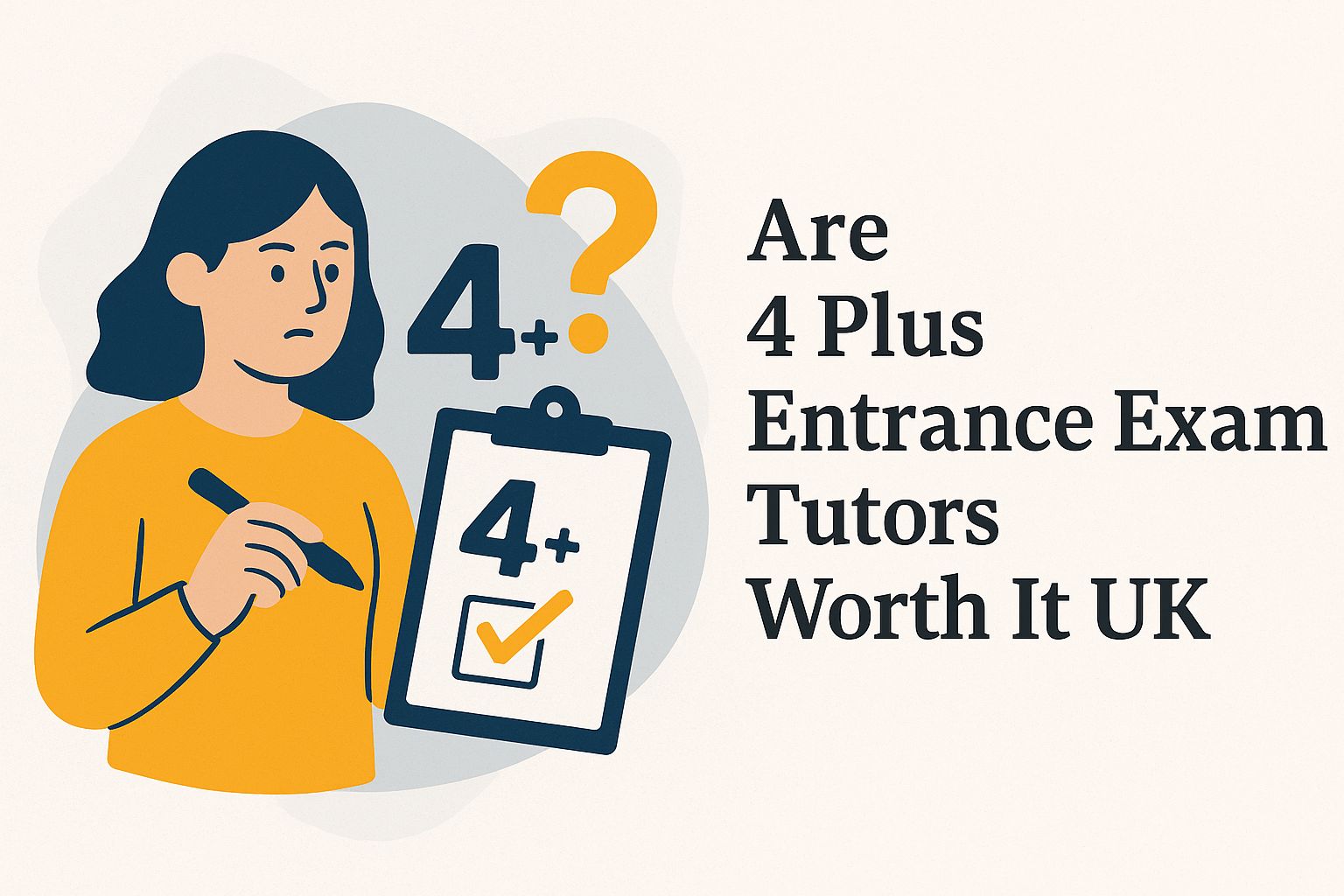
Are 4 Plus Entrance Exam Tutors Worth It UK
Navigating the maze of 4 Plus Entrance Exams can feel overwhelming, especially when your child’s future hangs in the balance. With a competitive education system in the UK, many parents find themselves asking: Are 4 Plus Entrance exam tutors truly worth the investment?
From understanding what these tutors offer to analysing their effectiveness, we’ll explore the benefits, costs, and even potential drawbacks. Stick around and uncover whether these tutors could be the secret ingredient to your child’s success!
Overview of 4 Plus Entrance Exams
The 4 Plus Entrance Exams generally evaluate verbal reasoning, numerical reasoning, and non-verbal reasoning, all aimed at determining a child’s readiness for school admission.
Verbal reasoning primarily assesses a child’s understanding and use of language, often including vocabulary tests and comprehension exercises.
Numerical reasoning, on the other hand, evaluates fundamental mathematics skills such as addition and subtraction, typically presented through word problems and numerical patterns.
Non-verbal reasoning focuses on a child’s ability to analyse and resolve problems using visual information, often through exercises that involve shape or pattern recognition.
To prepare effectively for these areas, it is beneficial to utilise a variety of resources, such as practice tests, educational apps, or workbooks specifically tailored to these skills. This approach ensures a well-rounded preparation for readiness.
See also: What Are the Subjects Covered in the 11 Plus Exam?
Importance of 4 Plus Exams in the UK Education System
These exams hold significant importance in shaping educational pathways, as they influence both school admissions and long-term academic trajectories. Achieving success in these exams can create opportunities for students to gain entry into prestigious institutions.
For example, those scoring in the top percentile often find themselves admitted to elite schools, which can considerably enhance their prospects for university.
On the other hand, poor performance can restrict options. Research shows that students in the bottom quartile may experience a 30% reduction in their chances of placement at their preferred schools. Many institutions rely on these scores as benchmarks for determining scholarship eligibility and advanced placement programmes.
Therefore, it is essential for students to prepare effectively through targeted study resources and practice exams. This preparation is crucial for maximising their educational opportunities and achieving their academic goals.
The Role of Tutors in 4 Plus Entrance Exam Preparation
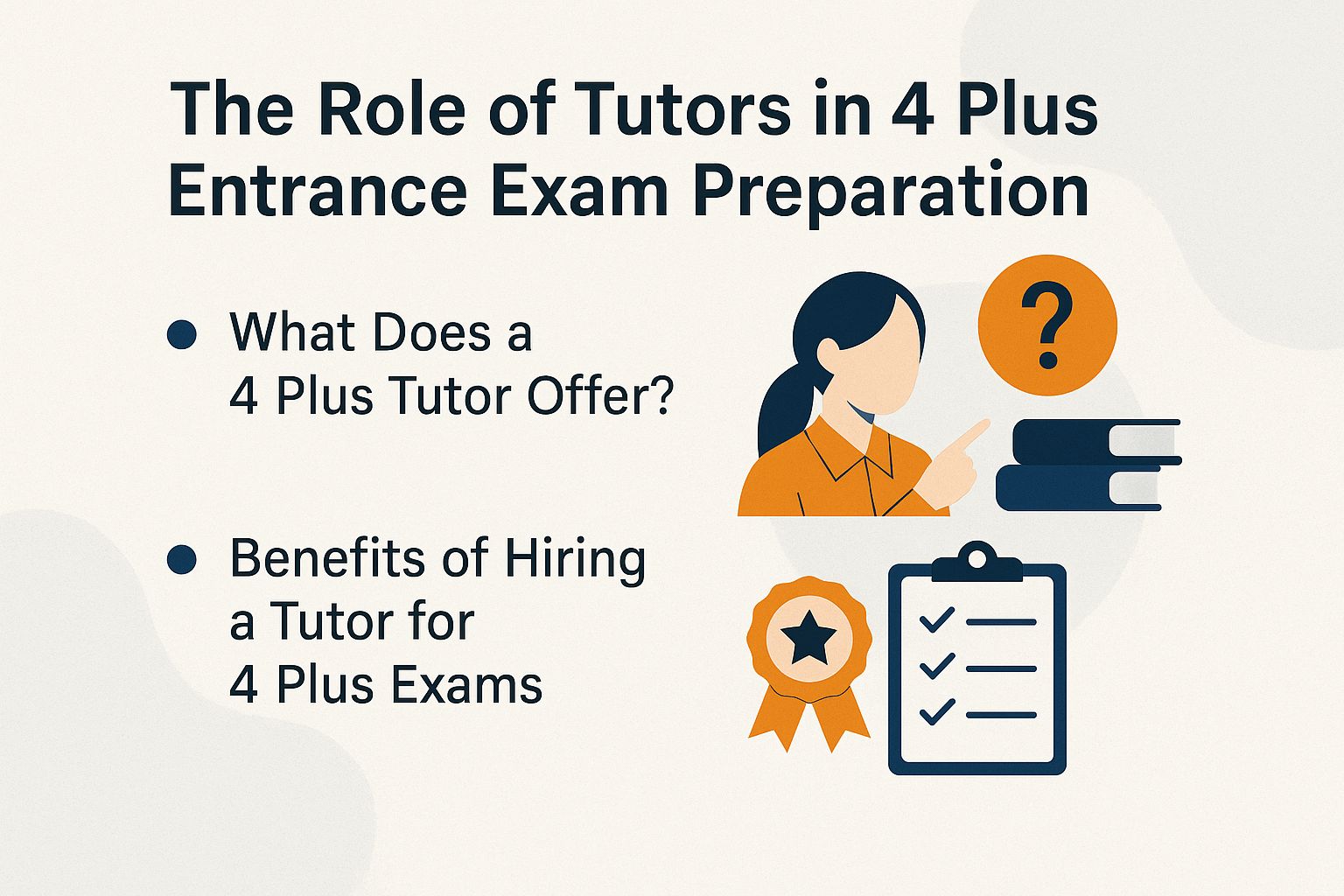
Tutors play a crucial role in helping students prepare for 4 Plus Entrance Examinations by offering personalised strategies designed to improve learning outcomes.
Their support can make a significant difference in a student’s readiness and confidence for these examinations. For an extensive analysis of this trend, our comprehensive study of AI tools for 11 Plus Entrance Exams illustrates how technology can support traditional tutoring methods.
What Does a 4 Plus Tutor Offer?
A 4 Plus tutor typically provides personalised learning plans, subject expertise, and customised practice materials tailored to meet the unique needs of each student.
Plus these individualised learning plans, 4 Plus tutors conduct one-on-one sessions that focus on specific subjects or skills. They often include practice exams that replicate real test conditions, which helps students build their confidence in a supportive environment.
Tutors also monitor progress through regular assessments, adjusting their strategies based on the results. For instance, if a student is having difficulty with algebra, the tutor may provide targeted exercises and frequent quizzes to evaluate improvement.
Many tutors also take advantage of online platforms such as Zoom and Google Classroom, which offer flexibility and ensure that students can access support from virtually anywhere.
Benefits of Hiring a Tutor for 4 Plus Exams
Engaging a tutor can lead to noteworthy improvements in students’ confidence and academic performance, often translating to higher examination scores. Research indicates that students who receive tutoring may experience an average score increase of 1-2 letter grades.
For instance, a secondary school student who is struggling with algebra might improve from a C to a B or even an A, which can significantly enhance their overall GCSE scores.
Additionally, a study conducted by the National Tutoring Association revealed that 85% of parents observed a reduction in their children’s anxiety after just a few tutoring sessions.
To maximise these benefits, it is advisable to focus on the following key areas:
- Regular sessions
- Tailored lesson plans
- Open communication with the tutor regarding specific goals
Cost Analysis of 4 Plus Entrance Exam Tutors
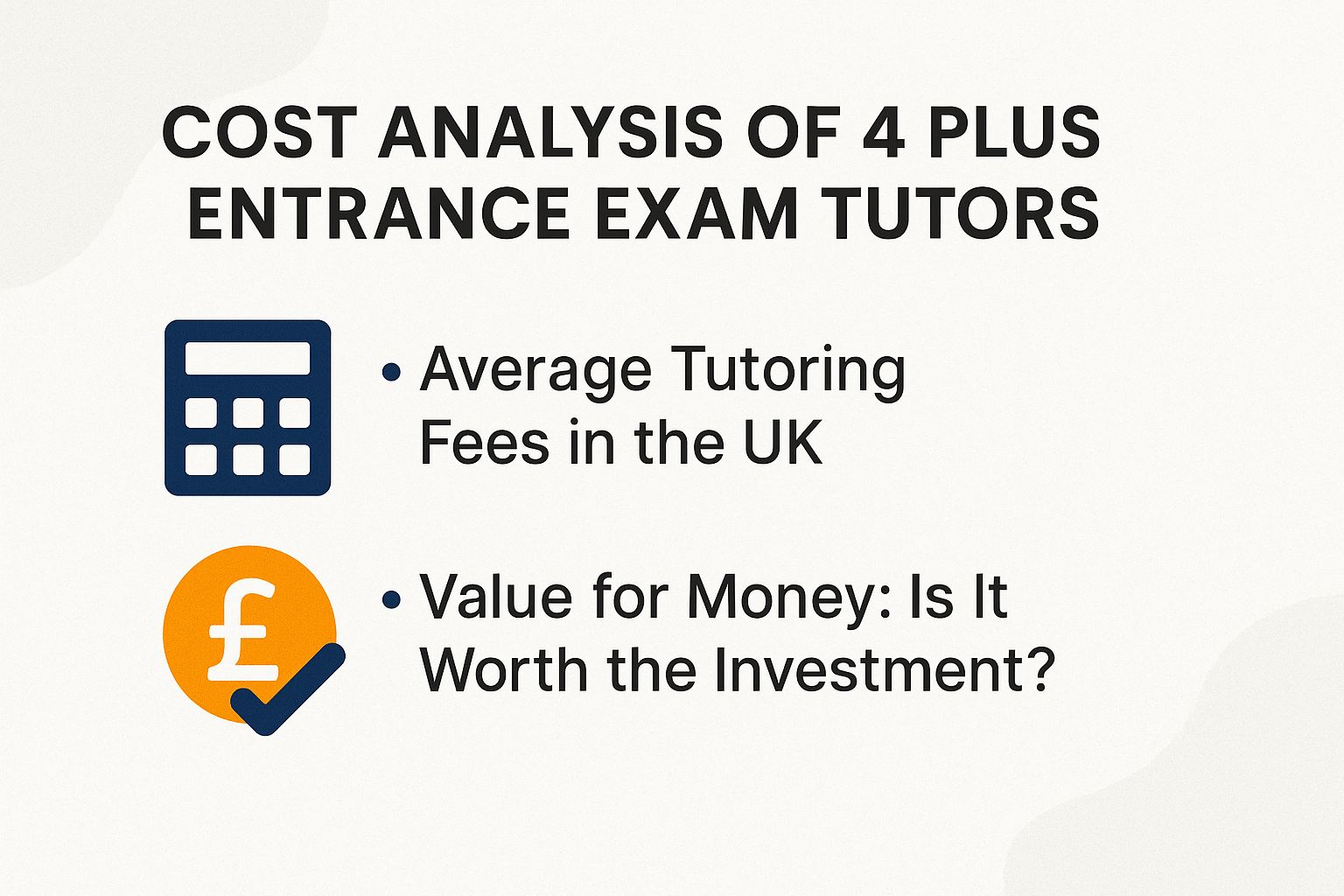
Understanding the financial implications of hiring a tutor is essential for parents who are investing in their child’s academic success.
Taking the time to evaluate the costs associated with tutoring can help parents make informed decisions that will benefit their child’s education in the long term.
Average Tutoring Fees in the UK
The average hourly rate for a private tutor in the UK typically falls between £30 and £60, influenced by factors such as experience and location. In areas with higher demand, such as London, it is not uncommon for rates to exceed £60. Additionally, subjects like maths and science often come with a higher price tag due to their popularity.
For those searching for more budget-friendly options, platforms like Tutorful and Superprof can be quite helpful. On these sites, you can find tutors offering group sessions or teaching lower-demand subjects at rates ranging from £20 to £30.
Furthermore, local community centres frequently provide tutoring programmes at reduced rates, making them an excellent alternative for anyone looking for quality assistance without straining their finances.
Value for Money: Is It Worth the Investment?
Investing in a tutor can provide substantial benefits, as many students successfully gain admission to top schools through focused preparation. For instance, a student preparing for the SAT with a specialised tutor often experiences score improvements of 100 to 200 points, which can be crucial for gaining entry into competitive universities.
Resources such as Khan Academy offer free practice materials, while personalised tutoring sessions typically range from £50 to £150 per hour. It is also important to track progress through periodic assessments, including full-length practice tests, to evaluate effectiveness.
By investing in a tutor, families not only enhance academic readiness but also acquire valuable insights into the admissions process, thereby improving the overall application experience.
Effectiveness of Tutoring for 4 Plus Exams
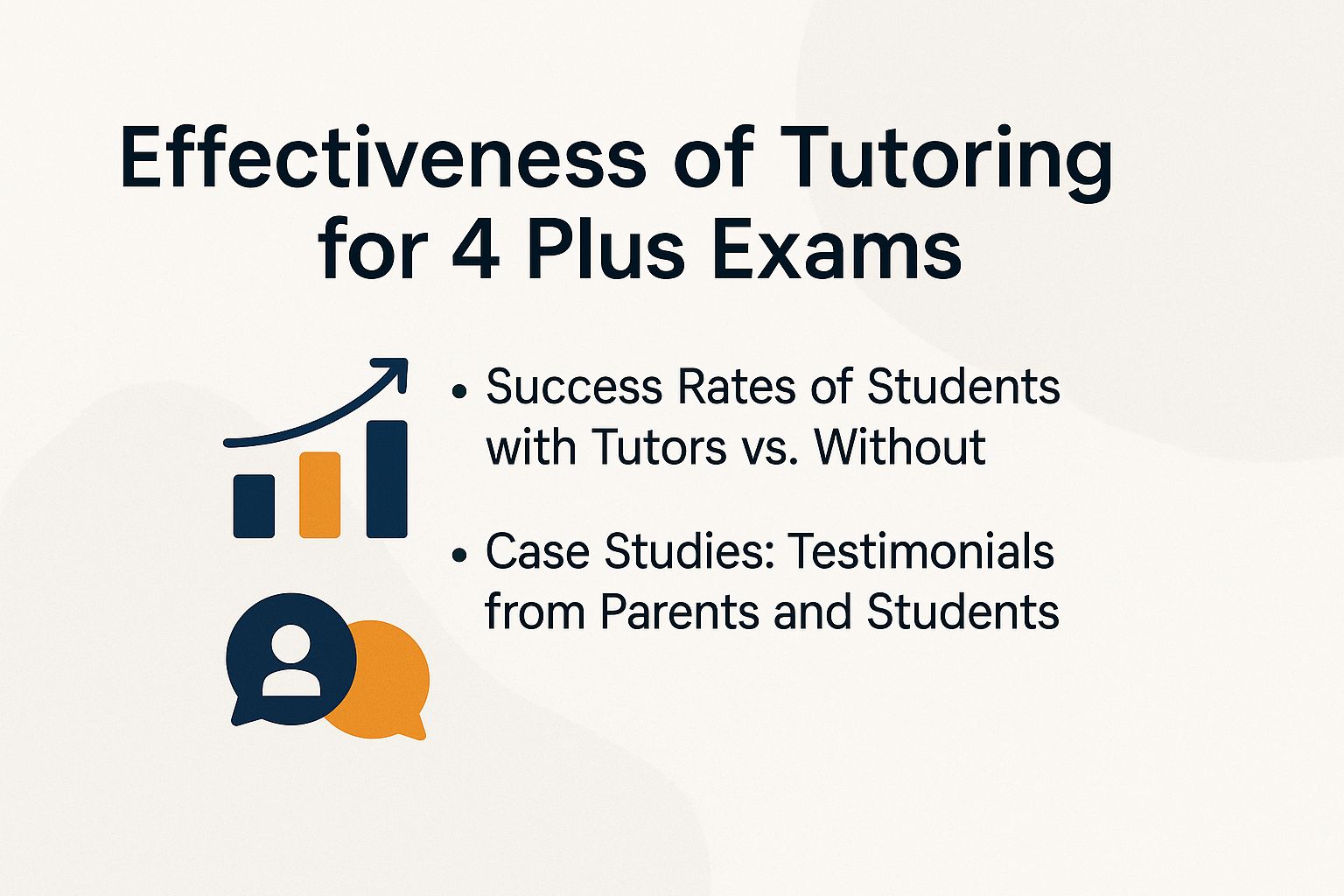
Research suggests that students who receive tutoring for the 4 Plus exams tend to perform better than their peers who study independently. This highlights the potential benefits of seeking additional support in their exam preparation. For those developing a study routine, understanding what should be included in an 11 Plus study plan can be particularly beneficial.
Success Rates of Students with Tutors vs. Without
Research indicates that students who work with tutors achieve a 30% higher pass rate in 4 Plus exams compared to those who prepare independently. This remarkable improvement can largely be attributed to the personalised attention and customised learning strategies that tutors provide.
For example, tutors typically assess each student’s unique strengths and weaknesses, enabling them to concentrate on the areas that require the most support, such as maths problem-solving or reading comprehension. Additionally, effective resources like Khan Academy and Quizlet can enhance tutoring sessions by reinforcing concepts through interactive practice.
As a result, students who receive tutoring not only acquire knowledge but also develop better study habits and increased confidence, both of which are essential for success in exams.
Case Studies: Testimonials from Parents and Students
Real-life testimonials illustrate how tutoring can significantly enhance the preparation experience for both students and their families.
For example, Sarah, a sixth form student, faced considerable challenges with calculus until she began attending weekly sessions with a tutor who utilised the Khan Academy platform. As a result, not only did her grades see a marked improvement, but her confidence also soared.
In a similar vein, the Hernandez family discovered that engaging in collective study sessions with a tutor who specialises in SAT preparation enabled their son to transition from a state of anxiety to one of enthusiasm as test day approached.
By investing approximately £600 over the course of three months, they were able to reduce stress levels and achieve remarkable improvements in test scores, demonstrating that targeted tutoring can provide invaluable support during academically challenging times.
Choosing the Right Tutor
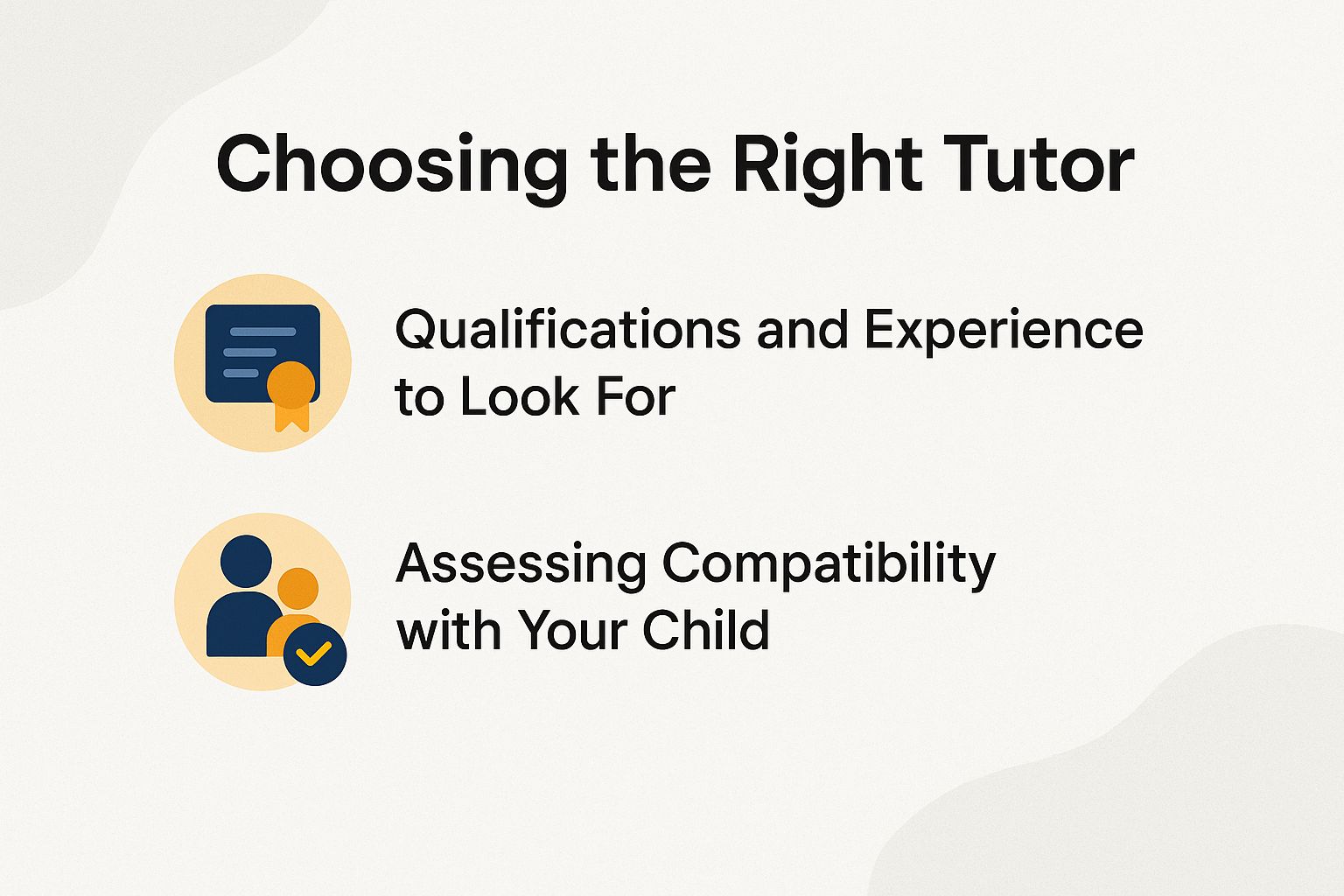
Choosing the right tutor is essential for providing an effective tutoring experience that is tailored to your child’s specific needs.
Qualifications and Experience to Look For
It is important to seek tutors who possess proven track records, relevant qualifications, and specific experience in preparing students for the 4 Plus exams. Focus on candidates who hold specialised degrees in education or have received training specifically related to exam preparation.
A tutor with experience teaching in primary schools or one who has previously coached students for the 4 Plus exams can be particularly beneficial.
Additionally, verify whether they have access to updated materials and practice exams, as familiarity with the testing format is essential for success. Requesting references or reading testimonials can also provide valuable insights into their ability to enhance student performance and confidence effectively.
Assessing Compatibility with Your Child
Establishing a strong rapport between the tutor and the student can greatly enhance the effectiveness of tutoring sessions.
To assess compatibility, it is advisable to begin with trial sessions, allowing both parties to evaluate their comfort levels and communication styles. Open dialogue about goals and expectations is essential, as this can help identify whether the tutor’s teaching methods align with the student’s learning preferences.
During these initial meetings, it is important to evaluate the tutor’s responsiveness and adaptability. Utilising tools such as Zoom or Google Meet can facilitate virtual sessions, providing broader access to quality tutors.
After a few sessions, reflecting on the student’s engagement and progress will aid in making a well-informed decision regarding the tutoring relationship.
Alternatives to Private Tutoring
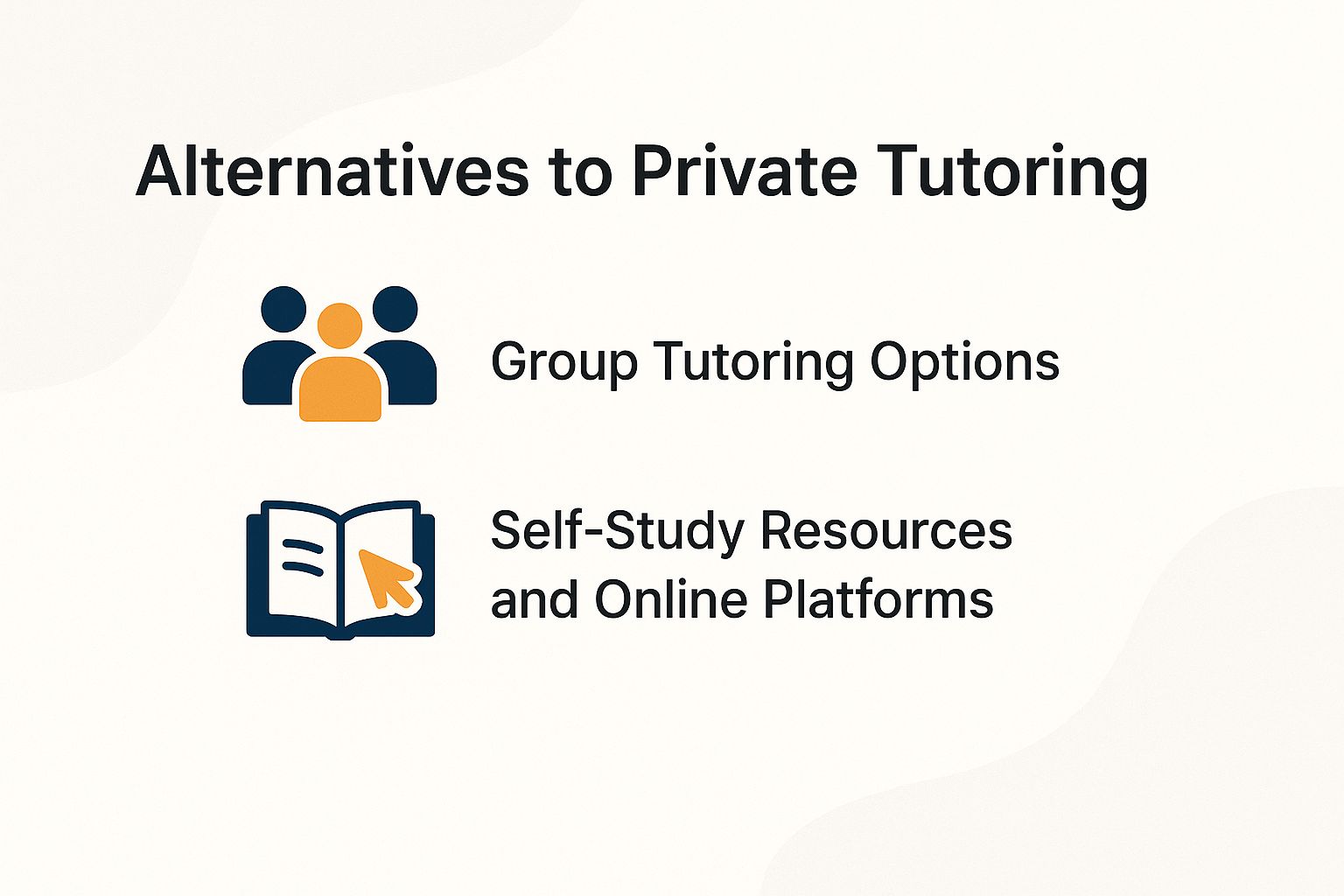
Parents who are looking for cost-effective methods may find that there are alternatives to private tuition that can also lead to positive outcomes for 4 Plus exam preparation. For instance, understanding the differences between educational institutions can be beneficial.
Related insight: Grammar schools often provide robust academic preparation, which might serve as a viable alternative to private tutoring.
Group Tutoring Options
Group tutoring presents a collaborative approach that enables students to learn from one another while significantly reducing costs. This method not only promotes social interaction but also encourages a variety of perspectives on problem-solving.
For instance, when studying mathematics in a group, students can gain a deeper understanding of concepts through discussion and peer explanations. By pooling resources such as study materials or online tools, the overall learning experience can be enhanced.
Many organisations also offer affordable options, allowing students to share the expense of a knowledgeable tutor. Through this collaborative effort, students not only save money but also cultivate a supportive learning community.
Self-Study Resources and Online Platforms
There are numerous online resources and study platforms available that can effectively support self-directed preparation for the 4 Plus exams, making learning both accessible and flexible.
For comprehensive video lessons across a wide range of subjects, Khan Academy is an excellent choice. If you are looking for a tool to help reinforce key concepts, Quizlet offers valuable flashcards and interactive quizzes.
In terms of practice tests, ExamEdge provides real exam-like questions specifically designed for the 4 Plus exams. Additionally, utilising mobile apps such as Anki can significantly enhance your study routine through the technique of spaced repetition.
By combining these resources, you can develop a well-rounded study plan tailored to your individual needs and areas for improvement.
Potential Drawbacks of Hiring a Tutor
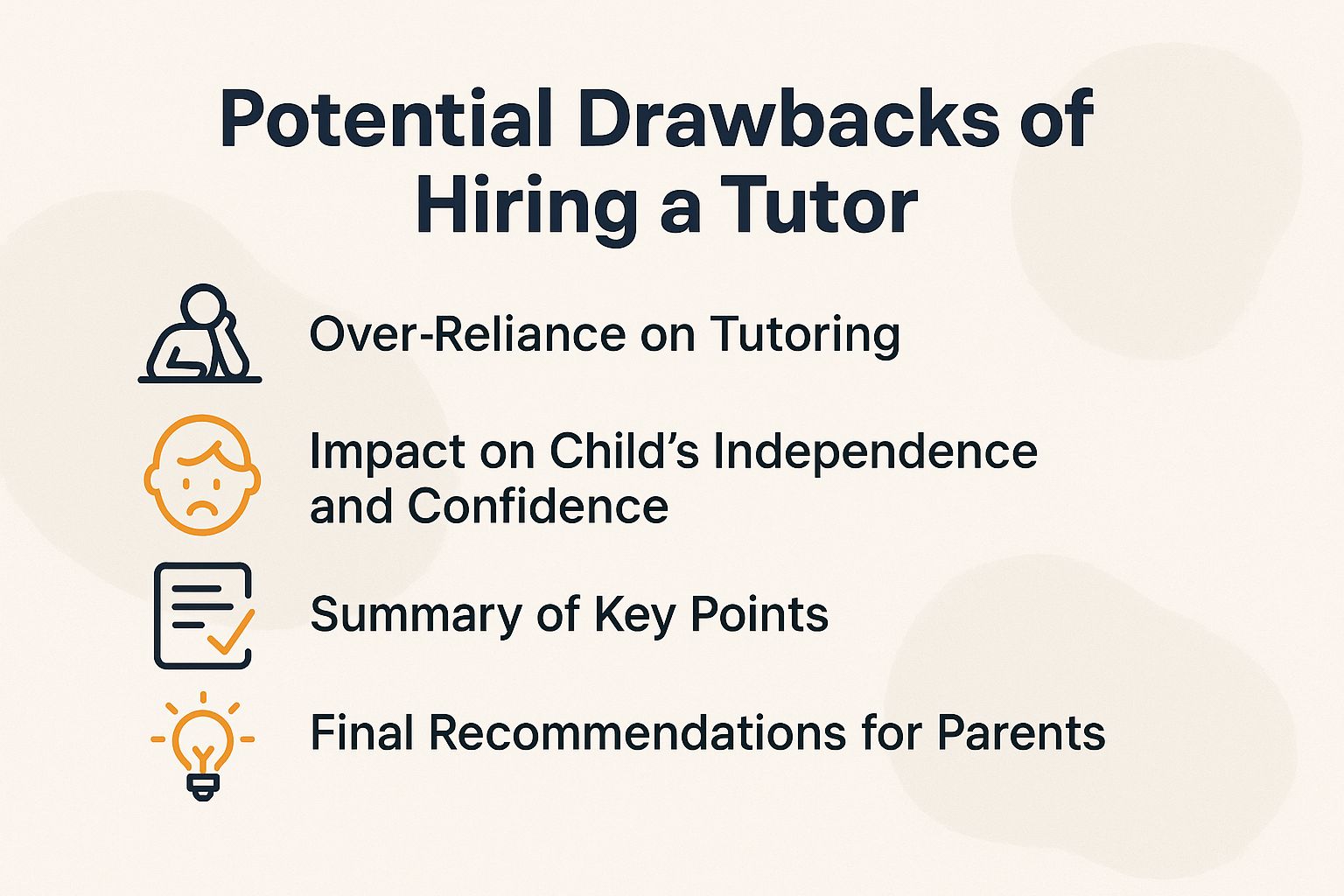
While tutoring can offer significant benefits, it is important for parents to also consider the potential drawbacks to ensure a well-rounded approach to educational support.
Over-Reliance on Tutoring
Students can sometimes become overly reliant on tutoring, which may impede their ability to study independently and develop essential critical thinking skills. To promote independence, it is beneficial to encourage students to create structured study plans. This can begin with setting specific goals, such as mastering a particular topic each week.
Utilising techniques like the Pomodoro Technique can enhance focus; students work in 25-minute intervals followed by brief breaks. Additionally, introducing self-assessment methods, such as practice tests, can help them identify areas that require improvement.
Encouraging the use of resources like online forums or educational platforms is also advantageous. This way, students can seek answers independently rather than depending solely on tutors. Such an approach fosters confidence and critical thinking, which are vital components of lifelong learning.
Impact on Child’s Independence and Confidence
Excessive tutoring can sometimes undermine a child’s confidence, leading to feelings of anxiety when they encounter independent tasks. To foster independent learning, parents can actively encourage their children to engage in self-study activities.
Creating a dedicated study space free from distractions can significantly enhance a child’s ability to concentrate. Additionally, utilising educational tools like Khan Academy for maths or Duolingo for language learning allows children to explore subjects at their own pace, promoting a sense of autonomy in their learning journey.
It is also beneficial to encourage regular goal-setting, as this practice enables children to track their progress and boosts their confidence in mastering new skills. Celebrating small achievements along the way can further reinforce their belief in their abilities, ultimately cultivating a more self-assured and confident learner.
Summary of Key Points
Tutors offer personalised assistance that can greatly enhance students’ performance and confidence as they prepare for the 4 Plus exams. Working with a qualified tutor can significantly improve a student’s understanding of essential exam concepts.
For example, a tutor might use practice tests specifically designed for the 4 Plus exam format, helping students become familiar with the types of questions they will face.
Additionally, employing online platforms like Khan Academy for supplementary resources, or interactive tools such as Quizlet for memorising key vocabulary, can further enrich the learning experience.
By scheduling regular, targeted sessions that focus on areas of weakness, students can build a stronger foundation, ultimately boosting their confidence as exam day approaches.
Final Recommendations for Parents
Parents should take the time to carefully evaluate potential tutors and adopt a well-rounded approach to support their children’s learning journey.
Begin by asking prospective tutors about their teaching philosophy and methods. It is important to find out how they customise lessons to accommodate different learning styles. For example, if your child has difficulty with maths, inquire about how the tutor simplifies complex concepts. Additionally, verify their qualifications and experience with students of similar age groups.
Establishing clear goals for tutoring sessions is essential. Consider asking, “What milestones should we aim for in the next month?” Engaging in this conversation not only clarifies expectations but also creates a collaborative environment that can significantly enhance your child’s educational growth.
Additional Resources
For those seeking further assistance, there are various resources designed to support students and parents in preparing for the 4 Plus exam. It may be beneficial to consider utilising the following effective tools:
- Khan Academy provides personalised practice tailored to meet individual learning needs.
- The Official Practice Tests from the exam board offer a realistic experience of the actual exam format.
- Parents can also discover valuable information and community support through forums like The Student Room.
- Participating in study groups can promote collaborative learning, allowing students to reinforce their understanding through discussion and shared insights.
By balancing these resources, one can develop a comprehensive preparation strategy that caters to different learning styles.
Frequently Asked Questions
1. Are 4 Plus Entrance Exam Tutors Worth It in the UK?
Yes, 4 Plus entrance exam tutors can be well worth it for many families in the UK. These tutors are highly experienced in preparing students for the highly competitive 4 Plus entrance exams and can provide personalised support and guidance to help students excel.
2. How can 4 Plus Entrance Exam Tutors benefit my child?
4 Plus entrance exam tutors can benefit your child in a variety of ways. They can help your child become familiar with the exam format, develop effective study strategies, and improve their confidence and test-taking skills. This can ultimately lead to better performance on the exam and a higher chance of getting accepted into a top school.
3. What qualifications should I look for in a 4 Plus Entrance Exam Tutor?
When looking for a 4 Plus entrance exam tutor, it is important to look for someone with a strong academic background and experience in helping students prepare for the 4 Plus exams. You may also want to consider their success rate and testimonials from previous students and parents.
4. How often should my child see a 4 Plus Entrance Exam Tutor?
This will vary depending on your child’s needs and the tutor’s recommendations. Some students may benefit from weekly sessions, while others may only need a few sessions closer to the exam date. It is important to discuss this with the tutor and come up with a plan that works best for your child.
5. Can 4 Plus Entrance Exam Tutors help my child with multiple subjects?
Yes, many 4 Plus entrance exam tutors are experienced in teaching multiple subjects and can provide comprehensive support for all areas of the exam. This can be especially beneficial for students who may need extra help in certain subjects or who want to improve their overall performance on the exam.
6. Are 4 Plus Entrance Exam Tutors only for students aiming for top schools?
No, 4 Plus entrance exam tutors can be beneficial for any student preparing for the 4 Plus exams. While these exams are often associated with entry into top schools, they are also used for admittance into a range of private and independent schools in the UK. Tutors can help students of all levels and abilities prepare for the exams and improve their chances of success.



